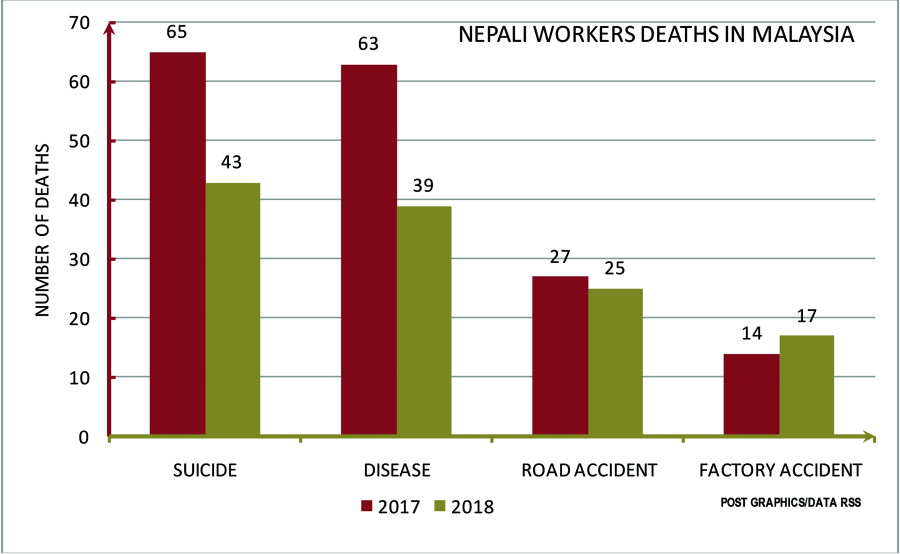National
One Nepali guest worker dies every day in Malaysia
One Nepali guest worker dies in Malaysia daily, Embassy of Nepal in Malaysia data shows.
Rastriya Samachar Samiti
One Nepali guest worker dies in Malaysia daily, Embassy of Nepal in Malaysia data shows.The reasons for death include suicide, road accidents, industrial accidents and serious diseases.
Nepal embassy data shows 322 Nepali guest workers have died so far in 2018 due to various causes. In 2017 there were 364 deaths.
Nepal Embassy Charge d’ Affaires Kumar Raj Kharel said among the casualties in 2018, the highest number, 43, was due to suicide followed by serious diseases (39), road accidents (25) and factory accidents (17), see graph.
Similarly, the number of people killed due to drinking excessive liquor, fighting and other reasons was 198. Among the dead, one is a woman whereas the rest are male.
Among the Nepali workers who died in Malaysia in 2017, 65 committed suicide, 63 died from serious ailments, 27 died in road accidents and 14 died in industrial mishaps. The casualty figure due to other reasons than the reasons mentioned before was 195.
Charge d’ Affaires Kharel said Nepali workers die mainly due to tuberculosis, liver ailment, dengue, and brain haemorrhage, and appendicitis, meningitis. Many workers also die due to train-hit, falling from moving bus, electrocution, murder, asphyxiation, chest infection, falling from terrace of tall buildings.
Latest data shows there are 383,000 Nepali guest workers in Malaysia. Kharel estimates the number of those working illegally after running out of their visa term is around 100,000.
Recently, Nepali workers have been unable to come to Malaysia as the bilateral labour agreement remains unimplemented. Due to this, the number of Nepali workers in Malaysia has declined. Prior to this, around 700,000 Nepali workers were in Malaysia, data shows.
Kharel, Nepali migrant workers suffered deaths due to lack of required skills for work, and inhospitable situation of Malaysia, said Kharel.
Knowledge and awareness about local situation, law and language skills are essential for any Nepali arriving here to work, he said. According to him, the embassy received around 200 complaints orally and in writing from migrant workers. Most of them verbally apprised the embassy and people concerned about the problems they face here.
Workers’ complaints are largely about not being paid wages, underpayment and different nature of work in violation of that promised in the contract. Such unexpected adversities compelled many to return home. If returning to Nepal is not possible, then frustration drives many to commit suicide.
Embassy Public Relations Officer Rabi Bhatta said they find it difficult even to collect the bodies. In case of the deaths of those residing here illegally, families are contacted before sending the bodies home. In case of poor families, the embassy bears the transport fare while in case of those working legally, the hiring company bears the cost for the transporting bodies.




 21.12°C Kathmandu
21.12°C Kathmandu















